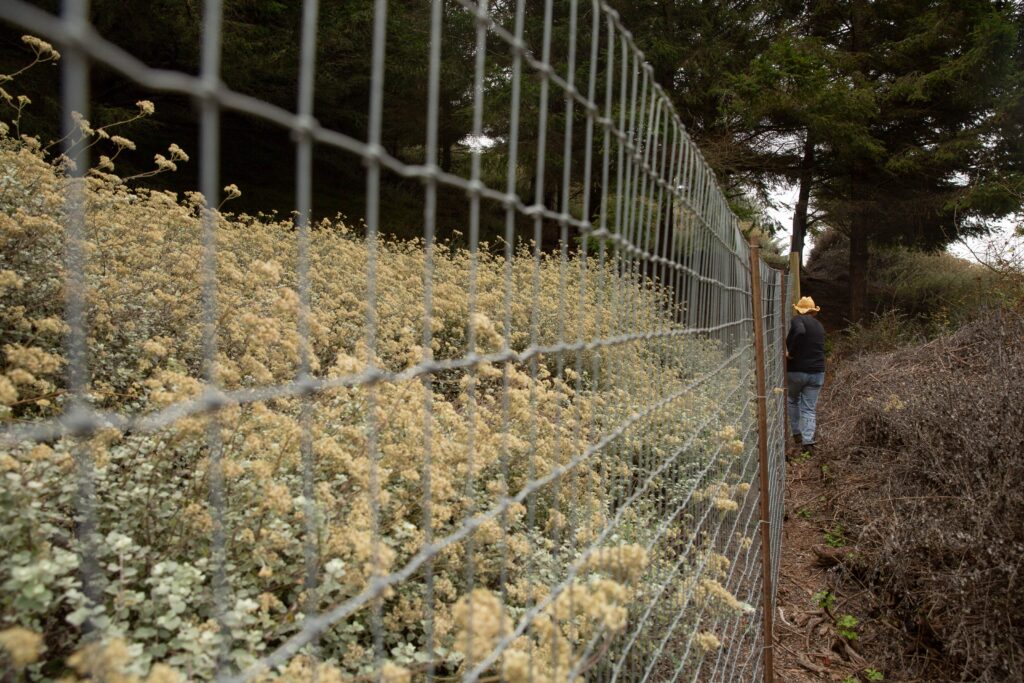
Sandra Guidi on Black Rock Ranch, photo by Paige Green
Sandra and Rob Guidi planned to enjoy retirement in a small California beach home. They ended up as Santa Cruz Island shepherds battling the effects of climate change.
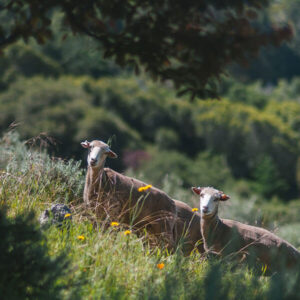
Santa Cruz Island sheep grazing at Black Rock Ranch, photo by Koa Kalish
“Our journey of living on a mountain and shepherding a small flock of Santa Cruz Island sheep was not well thought out or planned,” admits Sandra Guidi. “It’s become a true adventure, and sometimes that is the best plan of all.”
Following long careers in public service, the Guidi’s plan was to move to a tiny house in Stinson Beach, California, relax and exhale. But after renting a beach house for a year, the couple became intrigued by a nearby ranch. It began with seeing “exactly one photo on a for sale flier.” Conversations with the owner discovered shared values over multiple visits, and a handshake transferred the mountain into their care.
“We arrived with no furniture, no prior knowledge of plants, trees, or livestock, and absolutely no knowledge of land management,” Sandra readily shares. “However, we did realize the remarkable nature of the mountain and have spent the ensuing years trying to understand how to honor, support and respect our space.”
A “blank slate” landscape surrounded their passive solar house, and Black Rock Ranch was born.
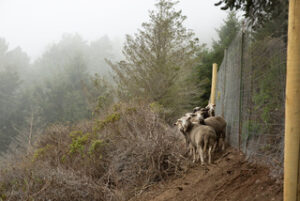
Santa Cruz Island sheep, photo by Paige Green
“We started with Italian varietals of olive trees representing peace, strong roots, and a fruit crop to harvest,” she continues. The trees were steeply discounted. Trunks that began pencil-thin, swaying in the coastal winds, are now strong with thick trunks and firm roots. Today, three separate olive groves thrive on the mountain.
“In hindsight, we admit to planting the trees before thinking about the water,” says Sandra. They eventually developed a roof catchment system with storage tanks at the top of the property and gravity-fed irrigation. They also added apple, plum, cherry, citrus, and native trees like elder and hazel, as well as wax myrtle, ceanothus, and native flowers. These trees and flowers are near the house on the lower slope of the mountain.
“Some of the trees, especially the olives, would like more heat,” she says. “But with a changing climate, it may happen.”
The Guidis welcomed chickens to Black Rock Ranch. But because the birds arrived before the plants or trees could provide coverage or hiding places, they lost a lot of birds learning hard lessons. The couple continued their research and took many classes, including a year-long course on organic gardening at the local junior college. “We kept learning.”
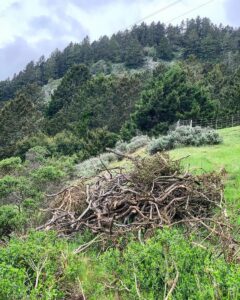 Land at the top of the mountain property is part of the Golden Gate National Recreation Area (GGNRA) under federal jurisdiction. Formerly considered grassland from a historic ranch, the area has transitioned to coastal scrub.
Land at the top of the mountain property is part of the Golden Gate National Recreation Area (GGNRA) under federal jurisdiction. Formerly considered grassland from a historic ranch, the area has transitioned to coastal scrub.
“We watched this area for three solid years, growing alarmed at the plant growth, and finally came up with a plan to address the increasing fire threat,” describes Sandra.
The Guidis local Fibershed community proved a tremendous resource. This non-profit develops regional textile networks throughout America while restoring ecosystems and communities. Fibershed embraces agriculture, manufacturing, consumer education, and climate challenges to reimagine the lifecycle of garments.
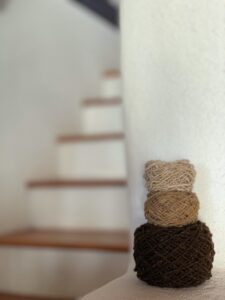
“Thanks to Fibershed and Teju Farrar, we learned the mountain and surrounding area was formerly inhabited for millennia by the indigenous Coastal Miwok tribe who tended this land, sustaining their community with fishing, hunting, and the harvest of edible plants and berries,” explains Sandra. “The tribe also put fire to the ground, enhancing the continued health of certain trees and bushes. We integrate continuing education like this into our lives to better understand how our actions affect a changing world.”
Fibershed also taught the Guidis that animals could be a stellar addition to land management. They settled on the perfect partners for Black Rock Ranch when they discovered Santa Cruz Island sheep, breeders Lynn and Jim Moody, and The Livestock Conservancy.
“We were looking for a small sheep breed for grazing the olive groves and coastal scrub,” explains Sandra. “Southdown sheep were considered although the ample wool around their eyes meant foxtail trouble.” A fellow Fibershed member pointed them toward the Moodys and Santa Cruz Island sheep.
“There are precious few Santa Cruz Island sheep living in the United States, and we were thrilled to learn of a flock in San Miguel, California, near the Channel Islands,” she explains. “We brought our starter flock from the Moody’s Blue Oak Canyon Ranch in November 2015.”
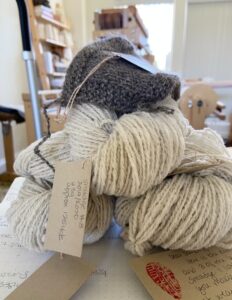
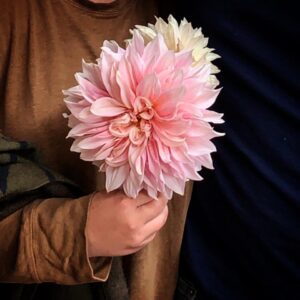
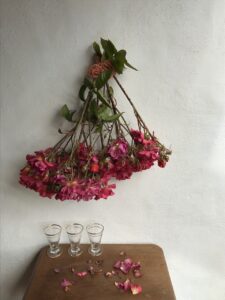
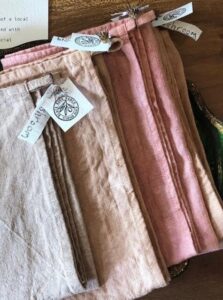
The density of coastal scrub made it impossible to see the ground, which was tinder dry from the ongoing drought. The terrain also included moderate-sized rocks protruding from the mountain.
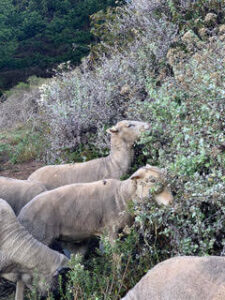 “With the help of Fibershed, we began a managed rotational grazing program with electric fencing and have seen good results. We also began spending a LOT more time with the sheep in the top pasture,” says Sandra. The Guidis reconstructed a fence line and cleared five feet beyond the fence to help thwart predators. They also began watching how long it took for plant growth to overtake the five-foot barrier. Coyote brush and helichrysum petiolare, a woody plant that climbs into trees and provides a perfect fire ladder, were thriving.
“With the help of Fibershed, we began a managed rotational grazing program with electric fencing and have seen good results. We also began spending a LOT more time with the sheep in the top pasture,” says Sandra. The Guidis reconstructed a fence line and cleared five feet beyond the fence to help thwart predators. They also began watching how long it took for plant growth to overtake the five-foot barrier. Coyote brush and helichrysum petiolare, a woody plant that climbs into trees and provides a perfect fire ladder, were thriving.
“The Santa Cruz Island sheep are small, thrive on poor forage, and are drought tolerant, adaptations from long periods of isolation in an island habitat,” notes Sandra. “They are both browsers and grazers, a dual efficiency that makes them formidable as a land management tool.” Their small stature also means less erosion on the steep slopes. “The sheep’s preferred forage is both coyote brush, which they defoliate and trim the stems, and helichrysum, which they eat and trample.”
In 2018, the Guidis began considering if their Santa Cruz flock could assist with fuel reduction in the impassable coastal scrub areas just above their ranch. Conversations and proposals included their local county fire department and the GGNRA, attempting to determine the sheep’s ability to reduce the fuel load on the other side of the ranch’s fence. Non-permanent fencing and a specialized mountain vegetation crew of firefighters were key. Fibershed also provided a Carbon Farm Grant, enabling the Santa Cruz flock to work further up the mountain in February 2021. The trees planted years earlier sequester significant amounts of carbon.
“One of the things we’ve learned in 46 years of saving heritage breeds from extinction is these livestock and poultry breeds must have jobs,” explains The Livestock Conservancy’s Program Director Alison Martin, Ph.D. “They have to be more than a charitable endeavor, no matter how well-intentioned, to play a sustainable role on ranches like Black Rock. Santa Cruz Island sheep are uniquely qualified to be a vital tool in fire prevention while providing meat, fiber, and breeding stock income for their shepherds.”
Reducing the fuel load above the ranch and strengthening ongoing partnerships is helping fight the effects of climate change and the constant threat of wildfire on the Guidi’s California mountain near San Francisco. The resilient Santa Cruz Island sheep continue to play a vitally important role.
“Working on a mountain is a collaborative effort, and building relationships is one of the foundational aspects of this work,” Sandra concludes. “We are beginning to understand our sheep’s role in this battle and recognize it cannot be done by us or the animals alone.”
For more information about Santa Cruz Island sheep, visit https://livestockconservancy.org/heritage-breeds/heritage-breeds-list/santa-cruz-sheep/ where you can also read an article about the history of Santa Cruz sheep by Lynn Moody.
***
Sandra and Rob Guidi, members of The Livestock Conservancy, run Black Rock Ranch. Their vision is to create a space that unites restorative land practices with growing the most wholesome and nutrient rich olive trees and happy rare breed animals.



